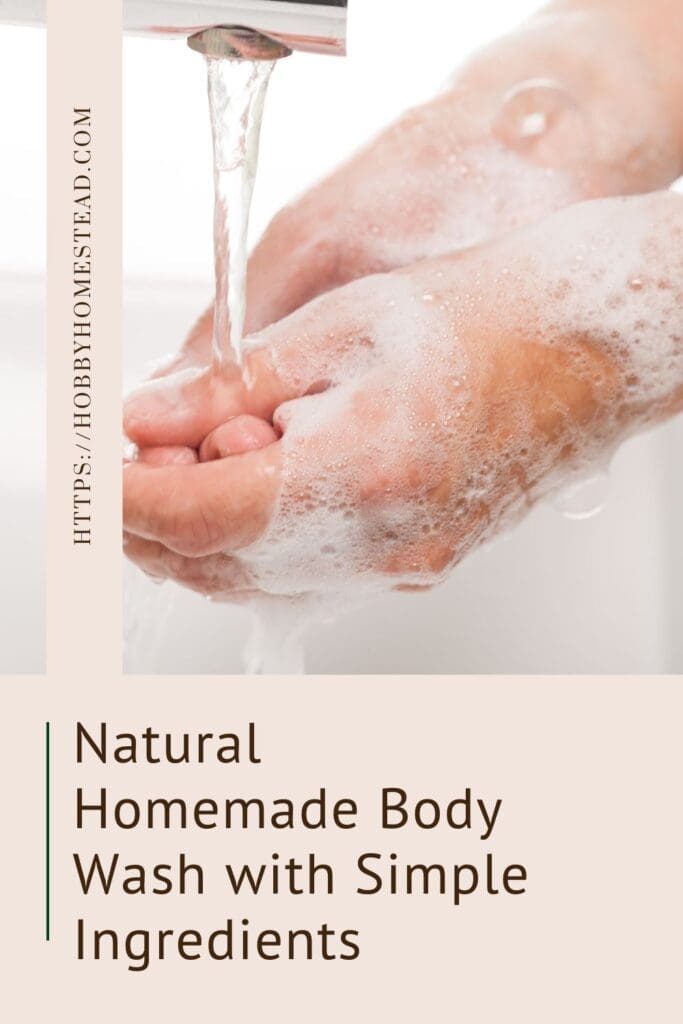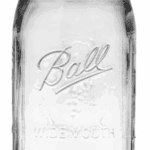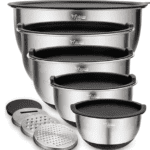Last updated on April 25th, 2025 at 10:23 am
Homemade body wash. All natural and leaves my skin soft and smooth. Has also massively helped me acne prone skin.
When it comes to personal care, I’ve found that making my own body wash is not only a cost-effective alternative but also a luxurious experience that’s perfect for my sensitive skin.
With this DIY body wash recipe, we’ve been able to avoid the artificial fragrances, harsh chemicals, and unnecessary additives common in store-bought body washes.
Castile soap body wash
It’s a great way to pamper yourself and the whole family with a personal care product that’s free from artificial fragrances and harsh chemicals.
One of the biggest advantages of making your own body wash is that you can tailor it to fit your skin’s unique needs. I have acne-prone skin, and this homemade body wash has been a game-changer, thanks to its natural antibacterial properties and soothing ingredients.

Natural Ingredients
By using natural ingredients like honey, essential oils, and Castile soap, this body wash leaves skin feeling soft, smooth, and well-hydrated—a perfect solution for the whole family, regardless of skin type.
The simple 1:1:1 mix of honey, liquid Castile soap, and a carrier oil (like coconut or castor oil) is gentle enough for dry and oily skin alike. I used castor and coconut oil. I also added Frankincense and Lavender essential oils.
You can customize it with your favorite essential oils. Like lavender for its calming effects or tea tree for extra antibacterial support. It’s a truly versatile recipe that brings out the best in my skin, leaving it hydrated without any residue.
Natural Homemade Body Wash with Simple Ingredients
As an Amazon Associate I earn from qualifying purchases.
Equipment
Materials
- 1/2 Cup Raw Honey
- 1/2 Cup Liquid Castile Soap unscented or your favorite scent
- 1/2 Cup Oil of choice, we used a mix of castor oil and coconut oil
- 10-15 Drops Lavender Essential Oil
- 5-10 Drops Frankincense Essential Oil
Optional Ingredients:
- 1 Teaspoon Vitamin E Oil for its antioxidant powers
- 1 Teaspoon Vegetable Glycerin for added moisture
- 1/4 Teaspoon Xanthan Gum to thicken the body wash
- 1 Teaspoon Shea Butter for extra hydration
Instructions
- In a clean mason jar or pump bottle, combine the liquid Castile soap, honey, and carrier oil. Stir gently to blend.1/2 Cup Raw Honey, 1/2 Cup Liquid Castile Soap, 1/2 Cup Oil
- Add 5-10 drops of your preferred essential oils, such as lavender essential oil for a calming scent, or tea tree oil for its antibacterial properties. You can mix scents to create your own favorite blend.10-15 Drops Lavender Essential Oil, 5-10 Drops Frankincense Essential Oil
- If adding any of the other ingredients, add those now.1 Teaspoon Vitamin E Oil, 1 Teaspoon Vegetable Glycerin, 1/4 Teaspoon Xanthan Gum, 1 Teaspoon Shea Butter
- Pour the mixture into a foaming soap dispenser or pump bottle. Give it a good shake before each use to keep ingredients blended.
- Store at room temperature, and use within 3-4 weeks for optimal freshness.
Body Wash Recipe Variations
For me, this body wash works wonderfully as a daily cleanser and can even double as a facial wash, thanks to the gentle yet effective cleansing power of the Castile soap.
Adjust the recipe in small batches, experimenting with different oils and scents until you find the perfect formula.
By creating your own beauty products, you’ll be able to enjoy a more personalized and eco-friendly skincare routine.
Add the Lavender and Frankincense essential oils. If using, add the vitamin E oil, vegetable glycerin, xanthan gum, and shea butter. Mix thoroughly.
For those with oily skin, consider adding a few drops of tea tree or citrus oils for their antibacterial properties.
Customize your body wash with your favorite essential oils and carrier oils like sweet almond oil, jojoba oil, or grapeseed oil for different benefits.
If you prefer a thicker consistency, adjust the amount of xanthan gum or add a small amount of guar gum.

Usage Tips
Store the homemade body wash in a pump bottle or any plastic container. Keep it at room temperature to maintain its shelf life.
Before each use, give the body wash a good shake to mix all the ingredients well.
Creating your own body wash is a wonderful way to take control of what goes on your skin. Not only is this natural body wash recipe simple and cost-effective, but it also ensures you’re using pure, natural ingredients that are gentle on your skin. Give it a try and enjoy the benefits of a homemade body wash that’s perfect for all skin types!
Can I Wash My Face with Body Wash?
While it’s possible to use body wash on your face occasionally, it’s generally not recommended as a daily facial cleanser. The skin on your face is typically more sensitive than the rest of your body, and many body washes contain ingredients formulated for tougher body skin, which might be too harsh for facial use.
Body washes can sometimes strip away natural oils, leading to dryness or irritation, especially for sensitive or acne-prone skin. If you do use body wash on your face, opt for a gentle, natural formula without harsh chemicals or artificial fragrances.
Can You Wash Your Hair with Body Wash?
Technically, body wash can clean your hair, but it’s not the ideal option. Hair and scalp have different needs compared to body skin, so shampoos are formulated specifically to cleanse the scalp, remove buildup, and balance hair oils.
Body wash lacks these targeted ingredients and may leave hair feeling dry, tangled, or not thoroughly clean. In a pinch, you can use body wash to wash your hair, but for long-term use, it’s best to stick with a shampoo suited for your hair type.
Using Body Wash as Hand Soap
Yes, body wash can be used as a substitute for hand soap and can be a great alternative in a pinch. Many body washes contain moisturizing ingredients, which can be helpful if frequent handwashing dries out your skin.
For hand soap replacements, try using a body wash that’s gentle, free from harsh chemicals, and preferably antibacterial if you’re looking for more thorough cleaning.

Choosing Body Wash Ingredients for Different Skin Types
When creating your own body wash, it’s important to tailor ingredients to your unique skin type. Each skin type has different needs, and the right ingredients can help you get the best results.
Sensitive Skin
Best Ingredients. Look for ingredients that are gentle and soothing, such as raw honey and unscented castile soap. Raw honey has natural antibacterial properties that help keep skin clear without causing irritation.
Essential Oils. Stick with mild essential oils like lavender or chamomile, which are less likely to irritate sensitive skin. Avoid strong oils like peppermint or citrus, as these can be too harsh.
Carrier Oils. Opt for a lightweight, non-comedogenic oil like sweet almond oil or jojoba oil that won’t clog pores or cause reactions.
Dry Skin
Best Ingredients. Ingredients that provide extra moisture are essential for dry skin. Adding vegetable glycerin or shea butter to your body wash can help keep skin hydrated and soft. Both have humectant properties that draw moisture into the skin.
Essential Oils. Choose oils that support hydration, such as rose or sandalwood essential oils. These oils not only smell lovely but also offer calming and nourishing properties.
Carrier Oils. Heavier oils like olive oil or hemp oil are excellent for moisturizing dry skin. These oils help lock in moisture, leaving skin soft and supple.
Oily or Acne-Prone Skin
Best Ingredients. Use ingredients that gently cleanse without stripping skin. Castile soap is great for its effective yet mild cleansing power. Adding raw honey also helps balance oils due to its natural antibacterial properties.
Essential Oils. Tea tree oil and frankincense are perfect for acne-prone skin due to their antibacterial and anti-inflammatory properties. Tea tree oil, in particular, can help control acne without drying out the skin.
Carrier Oils. Surprisingly, some oils can help balance oily skin by regulating sebum production. Jojoba oil is an excellent choice as it mimics the skin’s natural oils, which can help reduce overproduction. Grapeseed oil is also a good, lightweight option.
Combination Skin
Best Ingredients. Combination skin benefits from a balanced formula. Castile soap cleanses gently without over-drying, while a touch of raw honey can provide hydration where needed.
Essential Oils. A blend of lavender and geranium essential oils works well for combination skin, as they help to balance oil production while keeping the skin calm and nourished.
Carrier Oils. Try fractionated coconut oil or grapeseed oil for a light moisturizing effect. These oils absorb quickly, leaving skin feeling balanced rather than greasy.
Mature or Aging Skin
Best Ingredients. For aging skin, choose ingredients with antioxidant properties, such as vitamin E oil. This helps to nourish the skin and fight free radicals, which contribute to signs of aging. You could also add a small amount of shea butter for added hydration and a creamy texture.
Essential Oils. Frankincense and rose essential oils are particularly beneficial for mature skin due to their ability to promote cell regeneration and improve skin elasticity.
Carrier Oils. Argan oil or jojoba oil are wonderful for mature skin, as they provide moisture without clogging pores. These oils are also rich in essential fatty acids, which can improve skin’s elasticity and smoothness.
Final Tips
When creating a DIY body wash, the key is to adjust your ingredient list based on your skin’s unique needs. You can even experiment with small batches, swapping out essential oils or carrier oils to find the perfect mix for your skin type.
Making your own body wash allows you to avoid artificial fragrances and harsh chemicals, offering a gentler, more nourishing approach to skincare for all skin types.
References
National Center for Biotechnology Information (NCBI). NCBI has studies on natural oils and their benefits for different skin types, including specific research on oils like jojoba and grapeseed, which may benefit oily and acne-prone skin.
PubMed. PubMed offers extensive research articles on the properties of essential oils and carrier oils, including their effects on various skin conditions and types.






Thanks for this information.